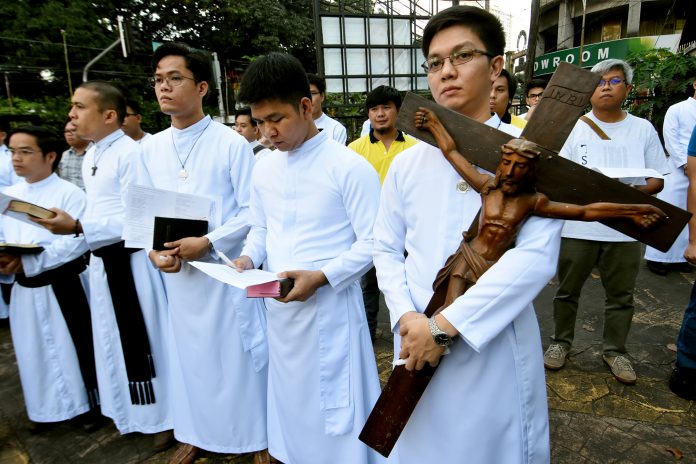“Servant Leadership” most dominant image and vision of the priesthood in the Ratio Formationis Sacerdotalis Nationalis (the recently updated Philippine Formation document) which we are reflecting on today.
This is based on the favorite image of PCP II (1991): “PCP II calls ordained ministers as servant-leaders of the community. In the name of Jesus Christ the head of the body, priests build up the Christian community of which they are part through their service as leaders and leadership as servants” (RFSN, 23).
That is a worthy and valuable vision. This is the image of Jesus himself who came to serve and not to be served. We need this so that we know where we are going, and what formation programs are necessary to reach the goal.
But we are very far from reality. This is the challenge of formation. This is the challenge of seminaries. This is the challenge to the whole Phillippine church.
The results of the synodal consultations in the dioceses bear out these comments from our people. There are positive points too, but it might help us more if we confront ourselves with the challenges.
This is how our people experience the priest. This is how our people experience the Catholic church, its processes, its ways of doing things, and its ways of treating people. I am forwarding this to help us in a real examination of conscience. It is hard but we need to face it. Cf. Salubong, https://synodphilippines.com/…/Philippines_National…
PROBLEMS WITH AUTHORITY. Priests are “authoritative and powerful”. Some have attitude problems. They scold people in public and do character assassination in the pulpit. Others are involved in abuse scandals
PROBLEMS WITH COMMUNICATION. The church’s communication process is top-down. Consultations are devoid of real conversations. Listening is selective; they only listen to the poor. Information dissemination whereby [people] are heard under the guise of consultation but in reality, it is only a means for ratification and immediate execution
PROBLEMS WITH ACCOUNTABILITY. Church management is perceived to be fraught with irregularities and inconsistencies. Inefficient in the administering of temporal goods; no accountability in matters of finances. No consultation with the faithful in the appointment of leadership roles; lack of transparency in the decisions that are made. Some parish priests do not like Parish Finance Councils, even if this is mandated by canon law. Some abolish their Parish Pastoral Councils; they run their parishes alone like monarchs. They are soloists. They do not like to sing in the choir, as it were. They abolished the choir.
These are the priests that our seminaries have produced. We do not invent these; this is how our people experience us.
Pope Francis has identified the culprit: clericalism. It is feeling a sense of entitlement as priests, of being enmeshed in positions of power, of wielding authority with brazen power. One young priest said in front of his parishioners: “Ako ang parish priest dito. Kaya ako ang masusunod.”
It is a situation quite far from the image of the priest as a “servant leader”. In the church, Pope Francis says, “The only authority is the authority of service, the only power is the power of the cross.” This is where authentic power resides, the power of witness and service, the power of the cross.
Quite a tough challenge for seminary formation in the Philippines of our times which needs to produce real “servant leaders” in our communities.
[Excerpt of my talk at the 7th National Institute for Seminary Formators, October 23-27, 2023 in Iloilo City].
Father Daniel Franklin Pilario, C.M., is a theologian, professor, and pastor of an urban poor community on the outskirts of the Philippine capital. He is also Vincentian Chair for Social Justice at St. John’s University in New York. The opinions and views expressed in this article are those of the authors. They do not purport to reflect the opinions or views of LiCAS News or its publishers.









